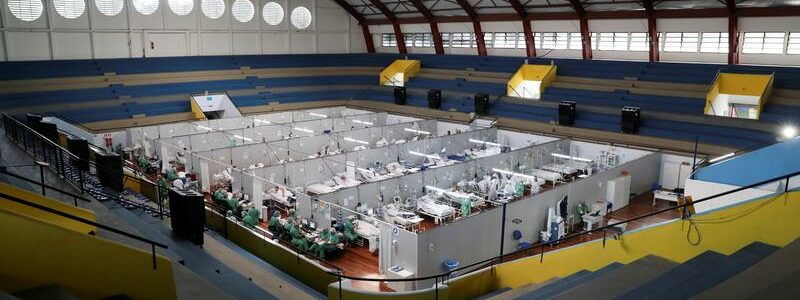
Brazil detects first case of South African variant, grave shortage looms as death toll soars
SAO PAULO (Reuters) -Brazil has recorded its first confirmed case of the highly contagious coronavirus variant discovered in South Africa, a fresh danger sign for a country already ravaged by the world’s worst daily death toll and scrambling to make space for burials.
Scientists warned on Wednesday that yet another new variant could be emerging in Brazil’s inland city of Belo Horizonte.
The Federal University of Minas Gerais said in a statement that two samples taken in the city included a previously unseen set of 18 mutations, including some in the same genes modified by the South African variant and Brazil’s already prevalent variant, known as P.1.
The detection of additional variants adds to concerns that a brutal COVID-19 wave battering Brazil may keep breaking grim records for weeks to come. On Tuesday, the Health Ministry reported a single-day record of 4,195 deaths, followed by another 3,829 fatalities on Wednesday.
Sao Paulo, the country’s biggest city, on Wednesday said it would begin opening some 600 new graves per day, well beyond the record of 426 burials in a day on March 30. The city is also preparing plans for a “vertical cemetery,” a crypt with 26,000 drawer-like graves that can be built in 90 days once approved.
The outbreak in South America’s largest country may overtake the United States to become the world’s deadliest, some medical experts predict.
The woman in Sao Paulo state now confirmed as infected by the South African virus variant was first identified by the Butantan biomedical institute as a possible case of a new local variant. Further analysis confirmed it as the first known local case of the variant widely circulating in South Africa and elsewhere.
Scientists fear a showdown between the South African variant and Brazil’s P.1 variant, both of which are more contagious and possibly more deadly than the original version of the coronavirus, worsening COVID-19 surges.
“It could be a huge duel,” said Maria Carolina Sabbaga, one of Butantan’s coordinators for studying new variants. “I think P.1 has already taken over. I’m not sure if the South African will overtake P.1, let’s see.”
The South African variant in studies appears to lessen protection from current vaccines.
José Patané, a Butantan researcher, said the variant most likely arrived in Brazil after traveling through Europe toward the end of 2020.
The first local diagnosis, a woman in her 30s in the city of Sorocaba, had not traveled abroad or come into contact with someone who did, indicating local community transmission, researchers said.
SLOW VACCINE ROLLOUT
A possible surge of the South African variant could further complicate Brazil’s slow vaccine rollout.
Brazil’s COVID-19 immunization program is built around the vaccines from AstraZeneca Plc and China’s Sinovac Biotech Ltd, which have proven effective against the Brazilian variant in preliminary studies, according to officials.
Research released on Wednesday showed the Sinovac shot was 50% effective at preventing symptomatic COVID-19 in a study of nearly 68,000 health workers in Manaus, where the P.1 strain first emerged as the predominant variant. The results support preliminary findings of separate research reported by Reuters last month.
Immunizations have been slow to ramp up in Brazil after the government dragged its feet last year in acquiring vaccines while other countries raced to secure supplies.
President Jair Bolsonaro has shifted his tone on vaccines, touting shots he had until recently disdained. But the far-right former army captain still opposes social distancing and mask requirements that health experts see as essential for curbing virus transmission.
Under pressure from business leaders desperate to vaccinate their workforces and reopen operations, the lower house of Congress approved a controversial bill to allow private-sector vaccine purchases. After the lower house concluded voting on amendments Wednesday, the bill will now go to the Senate for consideration.
The proposal would allow businesses to acquire vaccines to inoculate their employees as long as they donate the same number of shots to the public health system. Under current rules, businesses could only do that once the country has fully vaccinated risk groups outlined in a national immunization plan.
Source: Read Full Article